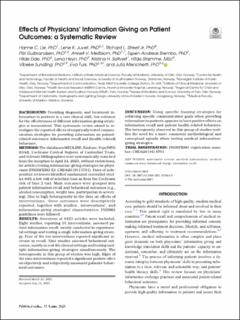| dc.description.abstract | Background: Providing diagnostic and treatment information to patients is a core clinical skill, but evidence for the effectiveness of different information-giving strategies is inconsistent. This systematic review aimed to investigate the reported effects of empirically tested communication strategies for providing information on patient-related outcomes: information recall and (health-related) behaviors. Methods: The databases MEDLINE, Embase, PsycINFO (Ovid), Cochrane Central Register of Controlled Trials, and relevant bibliographies were systematically searched from the inception to April 24, 2020, without restrictions, for articles testing information-giving strategies for physicians (PROSPERO ID: CRD42019115791). Pairs of independent reviewers identified randomized controlled studies with a low risk of selection bias as from the Cochrane risk of bias 2 tool. Main outcomes were grouped into patient information recall and behavioral outcomes (e.g., alcohol consumption, weight loss, participation in screening). Due to high heterogeneity in the data on effects of interventions, these outcomes were descriptively reported, together with studies’, interventions’, and information-giving strategies’ characteristics. PRISMA guidelines were followed. Results: Seventeen of 9423 articles were included. Eight studies, reporting 10 interventions, assessed patient information recall: mostly conducted in experimental settings and testing a single information-giving strategy. Four of the ten interventions reported significant increase in recall. Nine studies assessed behavioral outcomes, mostly in real-life clinical settings and testing multiple information-giving strategies simultaneously. The heterogeneity in this group of studies was high. Eight of the nine interventions reported a significant positive effect on objectively and subjectively measured patients’ behavioral outcomes. Discussion: Using specific framing strategies for achieving specific communication goals when providing information to patients appears to have positive effects on information recall and patient health–related behaviors. The heterogeneity observed in this group of studies testifies the need for a more consistent methodological and conceptual agenda when testing medical information-giving strategies. | |
